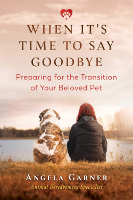
Image by Karen Nadine
Editor's Note: While this article is focused on pet bereavement, its precepts also apply to human loss and grief.
You may have invested a lot of time and care in ensuring that your pet was as comfortable as possible leading up to the close of their time, and perhaps you’re now trying to carry on with life and keep things as normal as possible for yourself and maybe your family.
As you may realize, emotions have a strong impact on wellbeing, so it makes good sense to take extra care of yourself during this time.
There is no doubt that grief can be exhausting, draining, and make one feel generally run down, so that coping with everyday things, such as work and looking after the home, becomes much more of a struggle than it would be normally.
Considerations about Personal Medical Conditions and Health
Physical and mental health issues, such as diabetes, heart conditions, depression, and asthma, can be affected by shock and emotional upset. If you are affected, do not hesitate to seek advice from your healthcare professionals during this turbulent time.
Sleeping
It is common to find it difficult to sleep for a few nights following a significant loss. If you experience this, avoid stimulants such as caffeine or alcohol for several hours before bedtime, and it may be worth trying some natural sleep remedies. If you can, plan your days with activities that won’t be stressful or need strong mental focus, such as driving long distances. If you’re still suffering from insomnia after three or four nights, you may need to consult your doctor or therapist for further help.
Eating
Shock can affect the appetite, and you may find that you’re not really hungry, perhaps even feeling nauseated or sick. Try to avoid just filling up on biscuits or crisps, and plan to have at least one light, healthy, and nutritious meal each day so that you’re not missing out on important food types for too long.
It’s not unusual to have an upset stomach, but obviously if this persists or your appetite doesn’t return after a few days, do go and see your doctor to check whether everything is okay.
Staying Hydrated
It is easy to become dehydrated during grief because the body loses fluids from tears and from not feeling like eating or drinking much. Dehydration can cause various unpleasant symptoms such as:
- dry mouth
- headaches
- dizziness
- fatigue
- generally feeling unwell
It can even cause mental confusion. Although you may not actually feel thirsty, your body could be crying out for fluids, so set yourself a programme of having a glass of water or juice or a hot drink every hour during the daytime.
It’s wise to limit the amount of alcohol because it can be dehydrating, and too much caffeine can make you feel jittery.
Your General Health
It’s important to recognize that you are going through a significant process and need to consider how to maintain your own health and wellbeing. Rather than taking a random approach, have a think about what will help you through this immensely difficult period.
For example, you could look at the best way to reintegrate into everyday life, including work situations or regular social activities. Are you the kind of person who copes better by having some quiet time each day, avoiding pressured or stressful situations? Or do you prefer to go out and see other people to help you to take your mind off things?
One lady who worked in a doctors’ surgery told me that she went straight back into work after she lost her dog. She did phone someone beforehand to say what had happened and to ask her colleagues not to say anything. She was aware that some people were sympathetic, whilst others didn’t really understand the immense upset one can feel after losing such a beloved companion animal. She said she was able to throw herself into her work and felt a bit removed from her pain while she was there, but would cry throughout the drive home and found going into an empty house incredibly difficult.
Another lady explained how she needed to take time out of work after she lost her dog, and how she coped when she went back into the office:
Thankfully, everyone at work knew how much I love animals, and understood that my dog meant the absolute world to me, so when Lily died on the weekend, I felt confident that I could contact my manager, Lynne, to ask to take a few days of my annual leave entitlement. I was too distraught to phone in, so I emailed to explain what had happened. It was a relief when Lynne promptly emailed me back to say to take what time I needed. This gave me the much-needed space to work through that awful initial feeling of shock and then the tears—I couldn’t stop crying for ages. I needed time to take on board what had happened and to get through the worst of it while everything felt so incredibly raw. After a few days, I emailed to say that I would be returning to work but asked that no one say anything to me about losing Lily, because I knew that the mention of her name would be enough to make me break down into tears, which I didn’t want to do in the office.
My colleagues were brilliant, and no one mentioned Lily for about a week, when a friend said she needed to say how sorry she was to hear my sad news. By that time, I could just about cope with the conversation.
These two examples demonstrate that it can be really useful to give some thought as to how best to reintegrate into your normal daily activities, rather than ploughing back in without any forethought. For example, you may need to return straight to work but not wish to discuss what has happened with colleagues, either because you don’t think they would understand or so that you don’t break down in tears.
It can sometimes be better to simply keep yourself to yourself and if anyone asks if you’re okay, say that you’re not feeling too well. It’s about doing whatever you need to watch your own back while you’re struggling with the initial stage of raw grief.
In summary, it is important to understand that grief is a process that we all have to work through from time to time in our lives. It takes time and effort and can be exhausting and draining; therefore, you need to look after yourself both physically and emotionally, especially in the early stages when you may feel particularly vulnerable.
The following relaxation exercise is designed to allow you to gently release some of the stress and strain which may have built up in your body.
ACTIVITY: Relaxation Exercise
Lie down and support your head with a pillow.
Take a couple of deep but gentle breaths, and allow what is currently on your mind to gently slip to one side.
Become aware of your head resting on the pillow. Gradually, let your head sink further into the pillow. Feel the pillow supporting your head, taking the strain and allowing you to rest your head fully.
Your shoulders are starting to relax and release into the surface beneath you. Take a deep breath into your chest, and as you exhale allow any stored tension to release.
Become aware of your back. Feel the surface beneath you willingly taking the weight of your back. Your back is fully supported and can let go of any tension that it has been holding. Feel your back and the surface beneath it becoming one.
Take a moment to notice the rhythm of your breath, its slow steady pace, as a feeling of calmness washes over you.
Continue to breathe gently and slowly.
Take a slow deep breath in, allowing the air to fill your chest and then your stomach. Exhale slowly, releasing any tension you may have been holding in the stomach. Repeat once more.
Continue to breathe gently and slowly.
Become aware of your legs. Feel the powerful muscles of your thighs. Gradually, allow them to rest, and use your out-breath to allow the rest to deepen. Your knees too will begin to soften as they release any tightness. Allow this feeling of relaxation to spread down through your calf muscles and into your feet.
On your next inhalation, take a long slow breath and allow the air to travel into your chest, through your stomach, and down your legs to the tips of your toes. Exhale slowly, allowing any remaining tension to flow out of your body.
Remain fully relaxed for as long as you feel comfortable. Slowly stretch the muscles in your legs and arms before continuing with your day.
Copyright ©2021. All Rights Reserved.
Adapted with permission of the publisher,
Findhorn Press, an imprint of Inner Traditions Intl.
Article Source:
BOOK: When It's Time to Say Goodbye
When It's Time to Say Goodbye: Preparing for the Transition of Your Beloved Pet
by Angela Garner Our pets are members of our families. The death or separation from a beloved animal friend--whether anticipated or unexpected--can unleash a roller coaster of emotions. In this compassionate guide based on 20 years' experience helping individuals and teaching veterinary professionals, Angela Garner offers practical support and guidance to help you prepare for your pet’s death ahead of time, do your best by your animal friend when the time comes, and work through your grieving process afterward.
Our pets are members of our families. The death or separation from a beloved animal friend--whether anticipated or unexpected--can unleash a roller coaster of emotions. In this compassionate guide based on 20 years' experience helping individuals and teaching veterinary professionals, Angela Garner offers practical support and guidance to help you prepare for your pet’s death ahead of time, do your best by your animal friend when the time comes, and work through your grieving process afterward.
Click here for more info and/or to order this paperback book. Also available as a Kindle edition.
About the Author
 Angela Garner is an animal bereavement specialist and former nurse. During 30 years in human healthcare as a Registered General Nurse, Angela developed a strong interest in end-of-life issues and communicating with the dying and bereaved with empathy and sensitivity. With a life-long passion for animal welfare, it was a natural progression to study and specialize in Companion Animal Bereavement Support.
Angela Garner is an animal bereavement specialist and former nurse. During 30 years in human healthcare as a Registered General Nurse, Angela developed a strong interest in end-of-life issues and communicating with the dying and bereaved with empathy and sensitivity. With a life-long passion for animal welfare, it was a natural progression to study and specialize in Companion Animal Bereavement Support.
She founded a national support service in the UK to help people through the grieving process, developing a wide range of pet bereavement support resources She was awarded a fellowship by the Society of Bereavement Practitioners for her work.
Visit her website: PetLossPress.com/

























